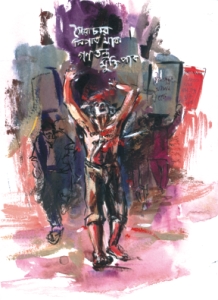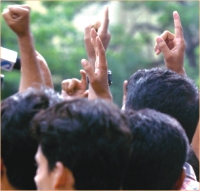
Inside
|
Struggling for democracy 1986-2006 Kamal Hossain discusses the on-going struggle for democracy in an independent Bangladesh, 15 years on from the pro-democracy movement of the 1980s and early 90s It is twenty years since some hard and bitter lessons should have been learnt. That was the year when the 1986 elections were managed and manipulated to legitimize an illegitimate military ruler. Black money, armed cadres, and gross misuse of power had made a mockery of the electoral process. The terms "voterless" elections and "media coup" are lasting reminders of that stage-managed election. Shocked citizens and independent observers, led by members of the British parliament, declared that election to be a "tragedy for democracy."
The movement for democracy gained momentum in the face of mounting repression, which claimed lives of numerous persons ranging from former parliament member Muizuddin, labour leader Tajul, a spirited youth Nur Hussain, whose slogan "down with autocracy, let democracy be freed" painted on his bare back remains an unforgettable icon, to Dr Milon, a brilliant young doctor and office bearer of the Bangladesh Medical Association. On November 19, 1990, the two alliances had publicly pledged that, upon the success of the movement, they would establish an effective sovereign parliament (in place of a rubber stamp parliament), a government accountable to parliament (in place of an authoritarian one person rule), an independent judiciary separated from the executive, the rule of law, and would ensure protection of human rights, freedom of the press and autonomy of the electronic media. Any change of government in future would only be through free and fair elections. The goal was to restore power to the people. The proper functioning of democratic institutions required empowerment of the people. We have since had four general elections: February 1991, February 1996, June 1996, and October 2001. The 1991 election was headed by a caretaker government headed by the sitting Chief Justice Shahabuddin Ahmad, who was appointed by agreement amongst the two political alliances, who ratified his appointment by enacting the eleventh amendment in the newly elected parliament. The caretaker government reconstituted the Election Commission which held the 1991 election. This paved the way for restoration of parliamentary democracy by enactment of the twelfth amendment. The next election was held under the incumbent BNP government in February 1996. The opposition boycotted the elections because of the manifest lapses of the Election Commission in the conduct of a by-election in Magura. The patently inflated results were rejected by the public and there was a compelling demand for a fresh election. The possibility of a re-election being held under a military dispensation was avoided by the introduction of the mechanism of an interim, non-party caretaker government. The thirteenth amendment to the constitution made this a permanent feature. Fresh elections were successfully held in June 1996 under the caretaker government headed by the retired Chief Justice Mohammad Habibur Rahman. In the election held in 2001 under Chief Justice Latifur Rahman the Awami League, having suffered defeat, alleged that the caretaker government had been partisan and that it had been a victim of "election engineering." Black money and sick politics This meant that the new breed of candidates were persons who had acquired black money through various corrupt means. They were willing to buy nominations by paying substantial amounts to party leaders and intermediaries who could assure them nominations. Many of these candidates had little or no background of public service or involvement with the problems of the people in the constituency that they claimed to represent. Many lived in the capital or moved to the capital, viewing their election as a business investment. They patronized armed cadres and local touts to manage and manipulate elections. Electoral laws which prohibited corrupt practices were violated with impunity as officials were susceptible to bribes. Dedicated party workers and volunteers who campaigned for honest and publicly-respected candidates were now replaced by mercenary election workers. These workers did not hesitate to engage in all forms of unfair practices. In turn, they secured a license for extortion and misappropriation of local development funds. This has led to a progressive degeneration of politics and made a mockery of popular representation. Respect for politics and politicians has continued to erode, particularly as ordinary citizens, especially the youth, are repelled by the spectacle of self-serving and corrupt members being elected to parliament. This sick politics contrasts with the healthy politics which in our history had enabled people to unite and successfully struggle for their rights, from the language movement of the fifties, the six and eleven point movement of the sixties, culminating in the struggle for liberation. This politics was temporarily revived in the late eighties by a popular movement which restored parliamentary democracy. The question in everyone's mind is why the pledges made to restore an effective parliament and an accountable government at the end of 1990 have remained unrealized. Successive parliaments have proved to be dysfunctional. The opposition has felt impelled to resort to boycotts, alleging that elections were neither free nor fair. The legitimate expectations of the people were that their problems would be debated and solutions devised, and that major policies would be developed in such critical fields as education, health, agriculture and industry, energy, and water. But these expectations remained unfulfilled. Fulfillment of the pledges of separating the judiciary from the executive, of putting in place a system of local government or a properly functioning anti-corruption commission, is still awaited. Proposals for electoral reform A truly independent Election Commission calls for appointment of the chief election commissioner and other members after effective consultations so that non-partisan persons enjoying public confidence may be appointed. It also calls for an independent secretariat not controlled by the executive and for direct grant of financial resources. The EC needs to be vested with powers to enforce its rules, in particular those intended to ensure that black money and illicit arms do not undermine the election process. Past experience shows that it is important to ensure that the key posts of the chief election commissioner and other commissioners as well as that of the head of the caretaker government must be held by individuals who are persons of integrity and strong personality who can act firmly to prevent and punish violations of the law. This applies to violations of election laws, most of which are also offences under the criminal law, such as transgressing election expenses limit, maintaining and deploying armed cadres, and bribing election officials and law enforcement personnel. The critical issue here is the failure to effectively enforce the laws. The core of the electoral process has been The cynical approach to elections is reflected in the prevailing attitude of political parties which, believing that an election cannot be won without black money, feel no hesitation in nominating candidates who have huge funds, and can prove this by making up-front donations to the party. Over the last 12 months, the country-wide movement for free and fair elections has created general awareness of the need for electoral reforms. The gnawing questions which face us are: why, fifteen years after the restoration of parliamentary system, representative institutions are not working and why we do not have clean politics or honest government -- and why good governance remains a far cry. The political parties in opposition have themselves recognized the imperative of electoral reforms if we are to have a truly representative parliament. The 14-party alliance put forward specific proposals on July 15, 2004. These were supported by other parties and alliances, and by an increasing number of citizens and professional organizations. They call for nominating honest and competent candidates. It is important to note that some of the key proposals were directed towards establishing a truly impartial and independent Election Commission and a non-partisan caretaker government, but there were also proposals which addressed the need for reform within political parties. These called upon political parties in search of candidates:
The Supreme Court requires the filing of such a declaration by candidates, when filing their nomination. This requirement can be strengthened by incorporating it into the election law. The required affidavit should also require that the income tax position of the candidate and the lifestyle statement filed with the tax authorities should be filed along with the affidavit. The law should provide that any false statement would incur disqualification. The Election Commission should strengthen its capacity to effectively scrutinize the declarations filed in a timely manner by establishing a special unit manned by experts, including forensic accountants. The Election Commission should be vested with adjudicatory powers to enforce its rules which are intended to prevent elections from being marred by unfair and corrupt practices. The adjudicatory wing of the Election Commission should be able to deal expeditiously with complaints and to impose deterrent penalties, including disqualification. When the entire country is yearning for healthy politics and a working democracy, the time has come for electoral reforms to be carried out with a sense of urgency if we are to stem the rot which threatens the existence of the constitution and democracy. The nation must unitedly act to ensure that the constitution is upheld, and that a vibrant democracy begins to fulfill the deeply-felt aspirations of our people for freedom and justice. Dr Kamal Hossain is Chairman, Gono Forum, and a Senior Advocate, Bangladesh Supreme Court. Freedom Freedom Translation: Fakrul Alam |
 From 1986 to 1990, an alliance of 15 parties led by the AL together with an alliance of 7 parties led by the BNP successfully pressed on with a joint movement to secure a free and fair election. A key demand was that no election under the incumbent military president would be acceptable. The incumbent made vain attempts to legitimize himself by holding a presidential election in 1986 which was boycotted, and a parliamentary election in 1988 (following the resignation of a large number of members of parliament) which was also boycotted.
From 1986 to 1990, an alliance of 15 parties led by the AL together with an alliance of 7 parties led by the BNP successfully pressed on with a joint movement to secure a free and fair election. A key demand was that no election under the incumbent military president would be acceptable. The incumbent made vain attempts to legitimize himself by holding a presidential election in 1986 which was boycotted, and a parliamentary election in 1988 (following the resignation of a large number of members of parliament) which was also boycotted. corroded by criminal practices, which are now taken to be accepted practices, as those who resort to such practices enjoy impunity. The major players in the election now regard the electoral process as a power game in which black money and armed cadres are indispensable. It is as if in the Olympics everyone were to condone a contestant taking steroids, or, if in the World Cup, to condone the acts of a referee who fails to show a red card to a player who assaults opposing players.
corroded by criminal practices, which are now taken to be accepted practices, as those who resort to such practices enjoy impunity. The major players in the election now regard the electoral process as a power game in which black money and armed cadres are indispensable. It is as if in the Olympics everyone were to condone a contestant taking steroids, or, if in the World Cup, to condone the acts of a referee who fails to show a red card to a player who assaults opposing players.